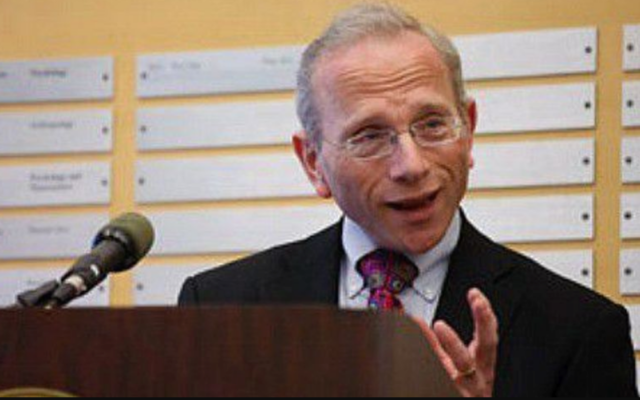Sarna Discusses ‘Tsunami of Hate’ After Oct. 7
Professor Jonathan Sarna in conversation described the many casualties following the attacks in Southern Israel.
While academics of the American Jewish experience are still sifting through the aftermath of the events of Oct. 7, one prominent historian believes what happened on that day in Israel was an important turning point in the lives of American Jews.
Professor Jonathan Sarna, the distinguished historian at Brandeis University, says that the attack by Hamas on several communities in Southern Israel that killed nearly 1,200 Israeli civilians and military personnel demolished longstanding assumptions.
He told an online audience earlier this month that one had to go back to Russia in March of 1881 when Czar Alexander II was assassinated to find a single day that has so punctuated longstanding Jewish hopes and assumptions about political change.
“We thought the mass murder, rape and kidnaping of innocent Jews, which is something many of us remember hearing about in Russian pogroms was all in the past. Well, that myth of security, I think, was shattered on Oct. 7. And that’s particularly true in Israel, although for different reasons. I think it’s true in other respects here … in the United States.”
In his hour-long lecture, Professor Sarna, who is often considered the dean of contemporary American Jewish historians, pointed out one of the first casualties of the successful surprise attack by Palestinian terrorists was the belief that over the years Jews and Palestinians had developed a common desire for peace.
He said that among those who were mired on Oct. 7 was Vivian Silver, the 74-year-old Israeli peace activist from Canada who lived in the Be’eri kibbutz near the Gaza border. She was the director of the Arab Jewish Center for Empowerment, Equality and Co-operation, but it made little difference when the kibbutz came under attack.

“Witnesses to those attacks were traumatized,” Professor Sarna said. They will never forget the unspeakable crimes against innocent civilians that they watched on that day. Those images are seared into their consciousness. It’s going to be much harder in the years ahead to persuade either them or any other Israeli that joint ventures for peace represent a realistic path forward.”
In America, in the aftermath of the attacks, Sarna pointed out, another casualty was the widespread belief that the threat of antisemitism that had been on the rise here was a phenomenon that was fueled mostly by conservative right-wing extremism.
What has emerged in the months since the attacks is what he described as a “tsunami of hate,” particularly from the progressive left on college campuses against Jews in America.
“The latest Jewish Review of Books has a piece from someone who reports that he had given an interview in which he talked about how the danger was antisemitism from the right. He gave that interview on October the 4th and after October the 7th, he asked the magazine not to run the interview, and he redid it because, he realized, that it no longer was true.”
Professor Sarna’s host for this searing critique of relationships between Jews and non-Jews was Rabbi Jeffrey Salkin, who launched his new Wisdom Without Walls website with Professor Sarna’s lecture.
Professor Sarna’s host for this searing critique of relationships between Jews and non-Jews was Rabbi Jeffrey Salkin, who, with co-founder, Dr. Sandra Lillienthal, launched their new Wisdom Without Walls website with Professor Sarna’s lecture.
“October 7 has, at least temporarily, set aside the typical divisions of Jews. Religious, secular, affiliated, unaffiliated, Reform, Conservative, Reconstructionist, various flavors of Orthodoxy, Renewal, Culturally Jewish, just Jewish’ —in the wake of October 7, it no longer matters. The heart of the Jewish people has never been more broken, but, paradoxically, the Jewish people have never been more whole.”
Likewise, Professor Sarna, who has published 30 volumes on American Jewish life and is the chief historian of the National Museum of Jewish History, takes a long view of the Jewish past, which shows that adversity, which is the theme of the holiday of Purim next month, has often created a new sense of purpose in Jewish communal life.
“There may well be a kind of Jewish revival that we will look back upon as a response to these events, Sarna hopefully predicted. “First of all, bouts of antisemitism going all the way back to ancient Persia have spurred revivals.
According to the Midrash, in the wake of Hayman, Jews rediscovered Judaism, and the rabbis really were making a very profound point about the impact of antisemitism on Jewish identity.”
Professor Jonathan Sarna’s conversation with Rabbi Jeffrey Salkin is available at https://religionnews.com/2024/01/11/antisemitism-america-sarna/ and at www.wisdomwithoutwalls.com

- Israel news
- Community
- Bob Bahr
- Jonathan Sarna
- Brandeis University
- hamas
- Czar Alexander II
- Vivian Silver
- Be’eri kibbutz
- Arab Jewish Center for Empowerment
- Equality and Co-operation
- Rabbi Jeffrey SAlkin
- Wisdom Without Walls
- The Temple
- Tikkun Ha'Am - Repairing Our People
- National Museum of Jewish History




comments